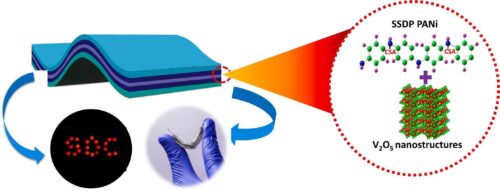The emergence of a hybrid electrode-based, flexible, symmetric supercapacitor exhibiting electrochemical characteristics, cycle stability, and a high energy density presents a prospect for addressing future energy storage needs.

Efficient and stable electrode materials for energy storage have long been a focal point of scientific research, driven by the escalating global energy demands. Among the many avenues researchers explore, supercapacitor electrodes hold a crucial position as they strive to approach the energy density levels typically associated with batteries. In this quest, conducting polymers, hailed for their pseudocapacitive properties and versatile applications, stand out as promising candidates capable of meeting the fundamental requirements for supercapacitor electrodes.
The Materials for Energy Storage and Optoelectronic Devices Group at Sanatana Dharma College, Alappuzha, has engineered a hybrid electrode-based flexible symmetric supercapacitor. This invention has electrochemical characteristics, exceptional cycle stability, and high energy density. The hybrid electrode is fabricated without using binders, comprising a combination of high-molecular-weight polyaniline (PANi) synthesised through a self-stabilized dispersion polymerisation process and vanadium pentoxide nanostructures created via a facile microwave-assisted technique.
Electrode Fabrication Method
Diverging from conventional methods that involve the application of emeraldine base powder cast as a slurry onto flexible substrates, this research adopts a unique approach. The electrodes are crafted from a dispersion of PANi, incorporating a secondary dopant in m-cresol. This distinctive preparation method plays a pivotal role in the outstanding performance of the hybrid electrode. It amalgamates the virtues of flexibility and conductivity, leveraging high-molecular-weight PANi synthesised through an organic solvent-mediated self-stabilized polymerisation process and exceptionally stable V2O5 nanostructures with remarkable rate-capability. The resultant hybrid electrode outshines individual materials, exhibiting a synergistic effect that significantly elevates performance.
The flexible supercapacitor device fashioned from these groundbreaking electrodes exhibits superior electrochemical attributes, featuring an impressive energy density and cycling stability. The performance benchmarks achieved by this innovation surpass those of supercapacitors using aqueous electrolytes, firmly establishing it as a frontrunner in energy storage technology.






